Any links to online stores should be assumed to be affiliates. The company or PR agency provides all or most review samples. They have no control over my content, and I provide my honest opinion.
I have previously written a post on upgrading my Helium Hotspot with the MikroTik LoRa 6.5dBi Omni Antenna.
When it comes to Helium antennas, a 5.8dBi variant can be an interesting option to explore. Generally speaking, the ‘dBi’ rating indicates the antenna’s gain—essentially, how well the antenna can focus energy in a particular direction. A higher dBi rating means that the antenna can send the signal further in that focused direction. However, it’s crucial to remember that gain doesn’t mean ‘more power.’ Instead, it’s more about concentrating the available power in a particular direction.
Let’s delve into some technical specifics to understand the potential range of a 5.8dBi and other gains for Helium antenna.
8dbi vs 5.8dbi vs 3dbi Antenna – Different antenna gains have different degrees of coverage
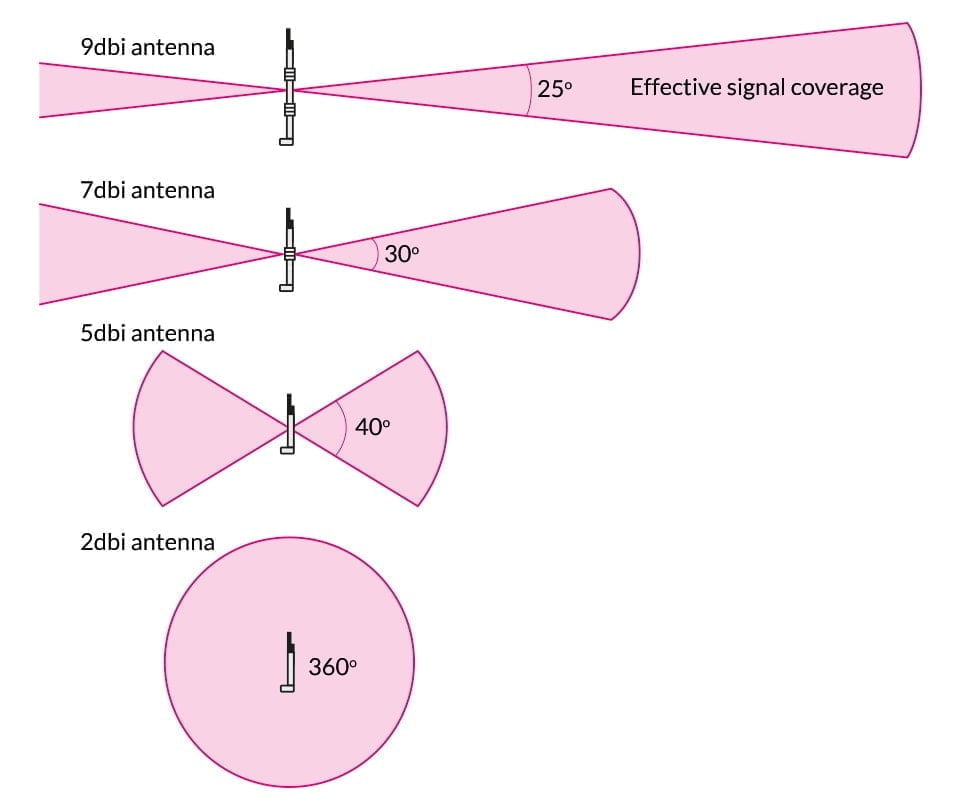
Omnidirectional antennas are not quite as omnidirectional as you think when you increase the antenna gain. So you can’t just buy a Taoglas Barracuda 12dBi antenna and think it will cover a huge distance with 360-degree coverage – trust me, I tried, and it is a super expensive antenna.
The gain of an antenna needs to be evaluated in the context of its environment. Higher dBi antennas tend to focus their energy in narrower lobes. While this makes them excellent for long-range communication in relatively flat terrains, they might not be ideal for hilly or multi-storey environments where a more isotropic radiation pattern might be beneficial.
Now, how does this translate to range? In perfect, free-space conditions without interference, a higher dBi would mean a greater range. However, in real-world scenarios—think urban landscapes with buildings, trees, and other obstacles—the effective range could be considerably less. Obstacles can cause attenuation, reflection, or diffraction of the signal, limiting how far it can effectively travel.
If you’re eyeing up a 5.8dBi antenna for your Helium Hotspot, you’ll want to think about your specific situation. If you’re in an area with a relatively flat topology and few obstacles, the higher gain could indeed extend your hotspot’s coverage area, perhaps even by a few kilometres compared to a lower dBi antenna. However, it’s not as simple as “5.8dBi will give me X kilometres of range” because so many variables can influence the effective range.
Moreover, placement of the antenna can also influence its performance. Higher elevations can mitigate some of the environmental challenges and help you achieve closer to the ‘ideal’ range that the antenna’s specifications might suggest.
A lot of people choose to use something around 5dbi or 6dbi because this will offer a good balance of range and being able to connect to nearby antennas at different heights as yours.
The lower the gain, the better the coverage, at 2dbi, you get 360° coverage, but at 5dbi, it drops down to 40° then 7dbi is 30°.
So in a city with a lot of hotspots around, you might be best off with a lower gain antenna.
Also, remember, you will need an antenna that is compatible with your specific region. Some antennas cover multiple frequencies, which is fine, as long as it covers your frequency.
- For the UK this is 868Mhz
- For the US this is 915Mhz
Optimal dBi for Helium Antennas For Different Environments
Flat and Open Terrain
Characteristics
In flat and open terrain, you’ll have fewer obstructions like hills, buildings, or trees to interfere with the signal. This setting usually allows antennas with higher gain to perform at their best.
Optimal dBi
In these conditions, you may want to opt for an antenna with a higher gain—say between 5.8 to 8dBi. These antennas focus the signal in a more narrow beam, making them ideal for long-range communication over flat surfaces.
Caveats
Although you’re likely to achieve longer range in these conditions, be mindful that higher-gain antennas are often more susceptible to noise from other RF sources, so some additional fine-tuning might be necessary.
Urban Environments
Characteristics
Urban environments present a unique challenge due to the presence of multiple obstacles like buildings, cars, and even people. These obstacles can reflect or absorb RF signals, making it difficult for the antenna to perform optimally.
Optimal dBi
In these scenarios, a lower-gain antenna between 2 to 4dBi usually fares better. The signal from lower-gain antennas tends to spread more isotropically, increasing the likelihood of the signal navigating around obstructions.
Caveats
While a lower-gain antenna will generally be more effective in urban settings, each individual location might have its unique considerations. Site surveys and RF spectrum analyses can be invaluable in these situations.
Hilly or Mountainous Terrain
Characteristics
These terrains are characterised by significant elevation changes, making it difficult for signals to travel great distances without interruption.
Optimal dBi
Lower-gain antennas in the 2 to 4dBi range are often more effective in these settings as well. The broader radiation pattern allows for more flexibility when the terrain is uneven.
Caveats
Higher elevations usually favour antenna placement. Even a lower-gain antenna might achieve improved performance when placed at a higher elevation to ‘see over’ some of the terrain features.
Indoor or Multi-Storey Buildings
Characteristics
Multiple floors and walls can significantly degrade RF signals. Material like concrete and metal can especially interfere with signal quality.
Optimal dBi
In indoor settings, an even lower gain antenna, possibly around 2dBi, might be the most effective. These antennas offer a more spherical radiation pattern, which could be advantageous when dealing with multiple floors.
Caveats
Placement becomes exceedingly crucial in indoor environments. Antennas should ideally be placed away from large metal objects and electronic equipment that could introduce noise into the RF spectrum.
Helium Hotspot Antennas for the UK 868Mhz models of the Helium Hotspot
Be warned, the Taoglas 12dbi option is not likely the best choice unless there are not many hotspots near you.
I wouldn’t personally buy from Nebra anymore, the way they have dealt with the Helium Hotspots is poor. But the below antennas are still worth considering. I personally use the Paradar 8.5dBi which I reviewed here and is available on Amazon.
- Glass Fiber LoRa Antenna Peak Gain (5.8dbi) by Nebra for £40
- Glass Fiber LoRa Antenna (3dBm) by Nebra for £35.99
- Various antenna options on CalChip (just make sure it is a 868Mhz antenna)
Helium Hotspot Antennas for the US 915Mhz models of the Helium Hotspot
- Signalplus Helium 10dbi Antenna
- LoRa Gateway Antenna 3dbi Gain Antenna – On Amazon with stock available on the 18th for $39.99
- 5.8dbi RAK Fiber Glass Antenna Kit for Helium Hotspot – $40
- Various antenna options on CalChip (just make sure it is a 915Mhz antenna)
Signal loss through the cable
You also need to consider how the signal degrades on the way back from the antenna to your hotspot. The longer the cable, the bigger the signal loss. Again, in hindsight, I messed up here buying cheap cables on Amazon. Similarly, if you use the SMA adaptors you buy on Amazon, you can potentially introduce further signal loss.
You can get low-loss cable, Amazon has lots of these listings, but a decent low-loss cable is LMR-400 which is harder to find and much more expensive.
Just be warned, the LMR-400 is very thick, I had an old hole coming through into my office for a TV antenna, and I only just managed to squeeze it through. I had previously run cables through a small window, leaving a small gap with the window partially closed, but this cable would have left a huge gap.
Custom cable and which connectors to use on your antenna
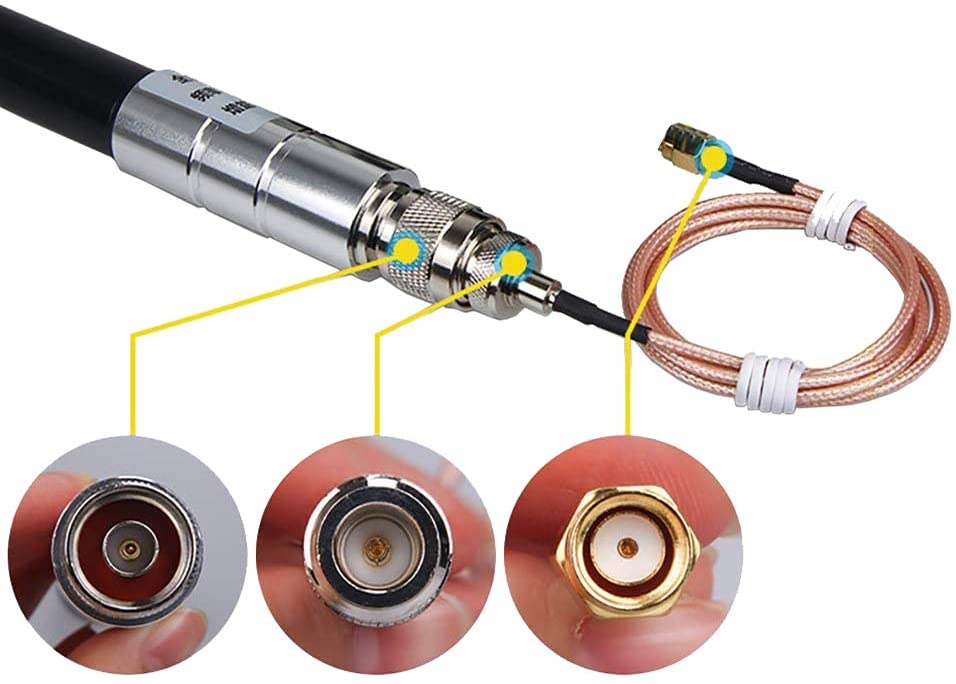
You can get cable made up to custom lengths, this will be your ideal option allowing you to select the minimum length required to reach your hotspot.
To avoid using adaptors, you will need to work out which cable end you need. For the MikroTik LoRa 6.5dBi Omni Antenna I use, it has an SMA female end while the Helium Hotspot has an RP-SMA Female .
So for the MikroTik, I needed the opposite connectors, which are RP SMA MALE (Helium hotspot side) to an SMA Male (Antenna side)
I ended up buying off McGill Microwave Systems on eBay. I think it was this cable but then I messaged them asking for the RP SMA MALE & SMA Male cable ends.
Some antennas use the larger N-Type Male connection, this includes the RAK 5.8dbi Fiber Glass Antenna Kit, so this would require a N-type female
If you get a cable made up I would suggest confirming with the company the exact ends required, I get easily confused with all the connector types and it is easy to get mixed up. A professional will know best.
Some of the options on Amazon are available below, but you may need to buy the adaptors to fit things properly.
| Preview | Product | Rating | Price | |
|---|---|---|---|---|

| TRENDnet (6m Low Loss RP-SMA Male to RP-SMA Female Antenna... | Buy on Amazon | ||

| Ultra Low Loss Coax Cable 10ft, Ancable N Male to RP-SMA... | Buy on Amazon |
I am James, a UK-based tech enthusiast and the Editor and Owner of Mighty Gadget, which I’ve proudly run since 2007. Passionate about all things technology, my expertise spans from computers and networking to mobile, wearables, and smart home devices.
As a fitness fanatic who loves running and cycling, I also have a keen interest in fitness-related technology, and I take every opportunity to cover this niche on my blog. My diverse interests allow me to bring a unique perspective to tech blogging, merging lifestyle, fitness, and the latest tech trends.
In my academic pursuits, I earned a BSc in Information Systems Design from UCLAN, before advancing my learning with a Master’s Degree in Computing. This advanced study also included Cisco CCNA accreditation, further demonstrating my commitment to understanding and staying ahead of the technology curve.
I’m proud to share that Vuelio has consistently ranked Mighty Gadget as one of the top technology blogs in the UK. With my dedication to technology and drive to share my insights, I aim to continue providing my readers with engaging and informative content.
Last update on 2025-07-01 / Affiliate links / Images from Amazon Product Advertising API






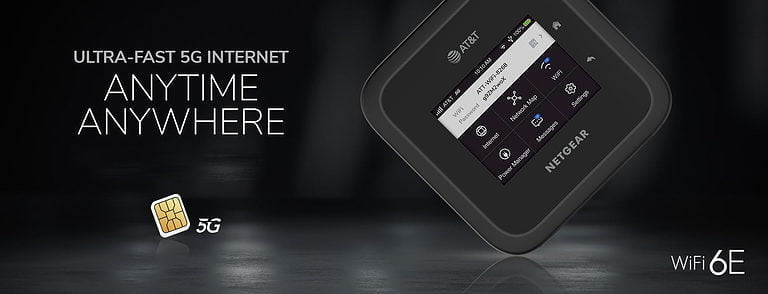
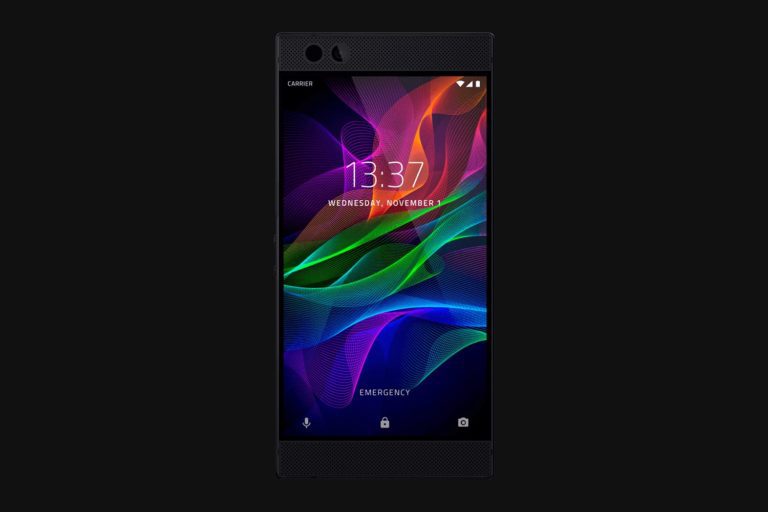

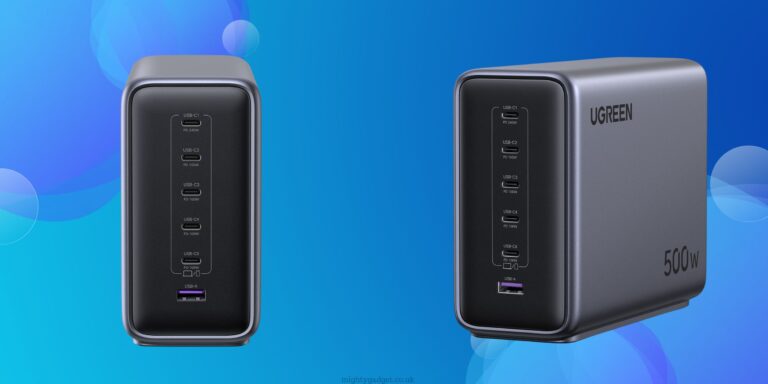
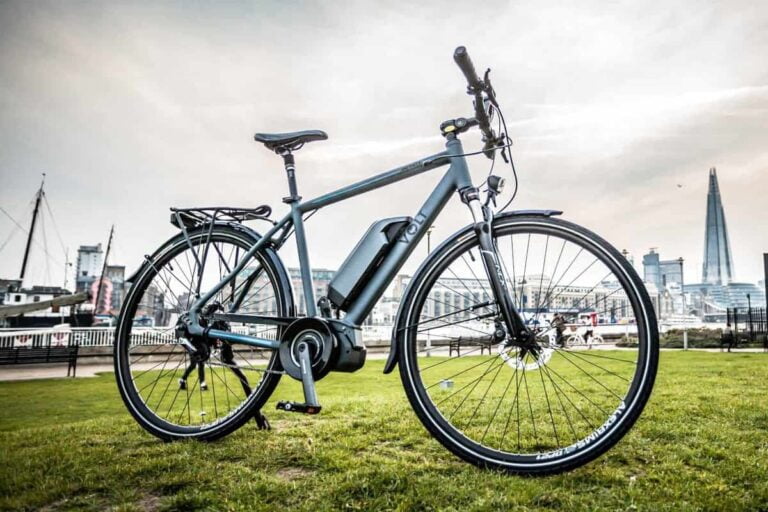
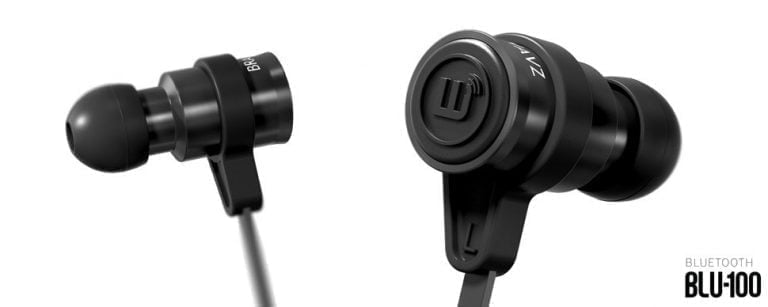
Hi thank you for this as it is informative, but can I make one additional note. An antenna works on both horizontal and vertical planes. What you highlight which is right, is the he higher the gain of the antenna it reduces propagation on the vertical plan, but still provides 360 degrees on the horizontal plane.
What this will mean is that you are likely to send or receive signals to or from further away but will miss the ones that are close by you. Therefore as you mention above you need to decide wisely in the case of a miner to which will provide you the best coverage.
There is a whole science around antenna’s which I admit not to a specialist picked up enough to do a radio course some time ago but thought it would help to support your article.
Ah, this makes much more sense. Yes they are much more complex than I thought they would be. Thanks for the input.
Hi bro,
I have 2 questions:
1) I live in area where near hotspot is 4km through air in the map so should I go with 3dbi or more dbi antena?
2) if 8dbi antena which cover 25° range and not 360° how do I know which way to point the antenna on the city area where are the hotspot so I cover the 25° range? is there some point marked on the antenna how should we point it?
thx
I’d probably go with the 8dbi.
I thought I had updated this post to be more clear about the effective signal, sorry. My information is slightly confusing, the effective range is on the verticle plane, so if you look at the diagram the antenna drawings are verticle as you would mount them. Therefore the 9dbi will achieve further distance but there is a good chance it will not pick up on hotspots closer by if you have positioned the antenna too high or low. So it is still 360-degrees but the effective area is more a flat doughnut shape rather than a ball.
So a high-density area is best off with the lower gain antennas ensuring you connect to everything close by, while sparsely populated are best off with high gain.
Hi
Please help me that doesn’t know about antennas but just got a Sensecap M1.
I need more info about actual distances? You talk about missing the near ones with a 8.5 dbi but what exactly is “near” ? And how far in meters does the actual antenna types go? I know I have about a kilometer to the next one right now. But I’m in a new neighbourhood that might see some more miners in the future.
What should I choose?
And thanks for great info!
Jonas
Maybe update this on PoCv11?
What do the side loves look like on each antenna?
What is the cable type for the frequency we are operating?
Hi, this is a great review of the Helium Hotspots.
I’m in the UK and have a Bobcat Miner and RAK V2 on the way. Can you confirm which antenna upgrades you would say are best to be placed outdoors on the roof?
Thanks in advanced.
The ones around 6dbi are probably the best option all around. Yes, as high as possible with a clear line of sight
I enjoyed your post. The links to the right cabling for upgraded hotspot antenna will prove useful. I am still on the lookout for a comparison table of the antenna that are shipped by default with a hostspot. This would help me identify the brand of my neighbours hotspots. Which out performs my own although being at a lower elevation and lower dbi !!
Great post thanks very much. Could have two miners on the same wifi router but both 300 meters apart in separate hexagons? Will this work? Just a thought.
Yep, this should work
Hi
Is it safe to use 5,8 db antenna inside home in long term? Thank you
What about 12dbi and 15dbi antennas?
In the UK it is likely that they will be breaking regulations. The new PoC v11 update that is or has rolled out will scale down the power to fit a regions regulations, so 12dbi and 15dbi could be pointless depending on where you live
Will the 5 – 6.5 dbi antenna still be useful in europe after the PoC v11?
Hello. I cannot thank you enough for this information. I wanted to share my situation.
My hotspot is ‘Acrobatic Wooden Beetle’. When you look at it, you will see that I live in a suburban area. Sub divisions here and there and no homes over 2 stories. Most homes are just 1 story.
I ran a 400LMR cable to a 10 dbi antenna 7 meters high (attached to my chimney)
Im frustrated because I still cannot witness anyone. Meanwhile I can do everything else. Any suggestions would be most welcomed. Thank you kindly in advance.
Hi I looked at your area on the Helium Map and I can tell you 2 things. 10 dbi is overkill for that area. Your missing all the people close to you since you are probably transmitting over their heads. This higher dbi you go the further you transmit but its beam is more narrow. Your antenna is at a good height. Try using a 5dbi antenna for that area. You will probably do much better. But theres another problem. You are registering as poor transmit scale on the map because your area is oversaturated. That means too many people in that area have hotspots.
Thank you very much for the reply which is extremely helpful. I am glad to say that I am using Amazon Prime and ordered a 4.5, 5 and 8 dBi antenna. I’ll test all of them and see which one gives me the witnesses I need and return the other ones. 😀
As for the transmit scale, I wish I could do something about that but it seems it’s one of those ‘It is what it is’ scenarios. Again, thank you for the guidance. Cannot wait to get this optimized.
Your welcome. Hope that the next antenna you use gives you better results. Let me know how it works out. Im setting up a few locations so love the real world data feedback results from other users. Just curious. What company did you purchase from on amazon ? Do you have a link to the amazon page ?
Thanks
Waiting on your test results, what you got?!
I have 20 miners and I use antennas from RFAreas, better I never seen.
Thanks very much for the information I have been looking to optimize my own setup and just pondering which antenna to go for.
My hotspot is “Fancy Turquoise Seagull” and on the standard setup is doing roughly 0.01 day if im lucky. Im really hoping to add change my setup to reach 6miles away where there is a city.
any information is much appreciated.
Thanks
It is because there are not many hotspots near you for you to connect to. If you look at Real Punch Mantis which you connect to, they have a 10 dBi antenna with placement at 9m allowing them to connect much further out.
It is worth noting that the effectiveness of high dBi antennas may be reduced in the future, but you’d likely get better performance from a 6dbi antenna and try and locate it higher up ideally clear from any obstacles (so on your chimney and maybe with a pole to extend the height a bit further)
Thank you very much James for the Feedback.
Hi, thank you for the information it’s really helpful. I do have a question. I have purchased a bobcat miner and I want to put an 6dBi antenna on my roof. I’ll need a cable around 8 metres long, can you suggest the best one to use? Thank you in advance.
For long cables like that, you will want LMR 600 – you will need it specially made for you and it is expensive – https://mightygadget.co.uk/go/mcgillmicrowave-lmr-600
This will likely be too thick to run into your house so you will want a shorter LMR 400 cable from the same company that I linked to.
Hi,
I am ‘Glorious Mandarin Robin’. My elevation is low compared to my surroundings and I am unable to witness nearby hotspots on a stock bobcat. Should I switch to a lower or higher gain?
4 dBi should be good enough to connect to the hotspots in your area. It is probably antenna placement or the quality of your cable. Get the antenna on your room for the best performance, or stuck it on your window outside. The very expensive and thick LMR 600 cable will provide the least loss, if you can keep the cable reasonably short then LMR 400 is fine.
Hi,
Thanks for all the info, much appreciated.
I have a quick question, I want to put the antenna at the roof of my building, around 15M high, which cable I can use to get the best quality and reduce the loss ? or is better to think putting the hotspot in the roof with a PoE ? and as I will be high which antenna you recommend me.
Another question is, that where I want to place it is just outside one of the green hexagons on the map, and the right place of this one [ Huge Stone Cow ] is that an issue ?
The hotspot that I will get in the next 4 weeks, is the MerryIoT Hotspot Miner V1
Again thanks in advance for your support and help, really appreciated.
If you can do it outdoors with POE that would be best. If not, you want LMR600 cable which is incredibly thick but about as low loss as possible. I buy mine from https://mightygadget.co.uk/go/mcgillmicrowave-lmr-600
For the antenna, 6dbi is a safe bet, if you are in densely populated area then 3dbi is fine. If in the UK I wouldn’t bother going about 6dbi. I have had good success with Paradar and Nebra antennas
If you are within 300m of another hotspot you won’t have quite as good earnings.
Thanks James for the quick feedback, appreciated.
if I use the distance meter from helium explore the one I mention is around 600m from where i want to place my hotspot but is an issue that I’m outside the green hexagonal, is this an issue or once i get my only i will create a new green hexagonal in the map ?
for me, regarding the management, etc.. it will be easy if i pull the 15m cable from the roof to my huis and connect everything at home to avoid any damage with weather conditions, will check how expensive 15meters cable of this LMR600 if to expensive i may get it connected with PoE at the roof.
and the antenna, will be looking for a 6dbi, either Paradar or Nebra as suggested.
The green hexagons just mean there is at least one hotspot within that hex. So it is advantageous to set one up outside of them, as you will definitely get the full transmit scale.
For the LMR600 cable, it will be too thick to route into the house, so you will want a short run of LMR400 attached to the cable and route inside to your hotspot – which will still need quite a big hole to fit through
Thanks James,
I will check once i have it what is the best solution, i may first test it with in the appartment around 3m high and then check all the necesary hardware and supply to move it to the roof, i think it will make diference placing this in the roof
Hi James, i do live in germany in a new energy efficiency building. I am not allowed to drill holes thru a wall to the outside of the building. Are there good connection cable available to lay it between Window and its frame with low Signal loss?
Thanks
David
I have used the antenna cable from the Nebra cables to go through the window. One of the best performing hotspots I have uses this method.
Mcgillmicrowave also sell some specialist window cables but they are all SMA connectors rather than the N type
https://www.mcgillmicrowave.com/helium-products/window-pass-through-cables/
Hey Farid
Did you get your MerryIoT Hotspot Miner V1 already and can you maybe give a quick review about how it is working?
Thinking about getting the same model, but can’t find much about it on the net.
Cheers
Hey James, thank you for the reply.
Looks like I replied to the wrong comment, sorry about that.
Tt was supposed to be a reply to this (https://mightygadget.co.uk/helium-hotspot-antenna-upgrade-guide/#comment-36815) one, since he said he will be getting that model in December.
Can you somehow move the comment or should I just repost?
You did reply to Farid. It was me that was being stupid!
Hi!
I was just wondering what would be best for me in a situation where I have the height of roughly 30m. Is it better to use a lower dbi antenna or higher?
Note: The other hotspots in my hexagon would all be within 300-500m and most of them are located at the height of 10m. I also live in Uppsala, Sweden where there are quite a few downtown which I also think I could reach, correct me if I’m wrong.
Wow, that is very high. I can reach up to 36km with mine so I expect you won’t have an issue with reaching downtown.
The 5.8dbi/6dbi are generally the best all-round antenna, that should give you both the range benefits of your height while still being able to see hotspots close by. It is hard to say though, if the vast majority of hotspots are 300-500m then a 3dbi may be better.
Hello,
What do you think for Europe what distance can I reaches with 3, 5 and 8 dB. Most points around me are 10 km away, I can raise the antenna to a height of 25 m. Thanks.
The 6dbi antenna on my house is currently witnessing a hotspot 38km away and is about 8m up. The 3dbi hotspot I have at friends, which is a bit lower down, is connecting to someone 39km away!
Height does seem to help a lot, one of the hotspots in Blackburn is 8.5dBi and 20m and that connects to another hotspot 80km away
Hi,
Thanks a lot for a great expatiation.
Can you look at my gateway: ‘Alert Hotpink Skunk’.
After recent problems and updates my Rak v2 does not have any witnesses 🙁
Yesterday morning there were about 33 witnesses (no changes in setup).
See discovery result
Hotspot Name Packets Heard RSSI SNR
fierce-cerulean-panther 3 -109 -19
strong-banana-bear 2 -117 -15.5
blurry-sepia-manatee 3 -119 -14
vast-frost-cow 3 -107 -19.200000762939453
oblong-sandstone-liger 5 -115 -20.5
big-fuchsia-salamander 1 -116 -21.5
innocent-steel-cat 1 -111 -22.799999237060547
amateur-crepe-gazelle 3 -118 -13.199999809265137
glamorous-emerald-panda 9 -105 0.5
polite-aqua-reindeer 4 -112 -20.200000762939453
clumsy-sepia-gerbil 4 -109 -5
fast-denim-griffin 9 -119 -9.800000190734863
polite-coffee-elk 1 -119 -14.5
crazy-rose-sparrow 7 -118 -13.199999809265137
striped-tan-ram 9 -111 -6.800000190734863
trendy-aqua-troll 1 -111 -17
proud-eggplant-wolf 9 -97 -7.5
electric-clear-gerbil 3 -120 -18.200000762939453
unique-tartan-bison 1 -118 -18
handsome-mandarin-dalmatian 1 -117 -15.199999809265137
square-tangerine-pangolin 1 -112 -20.799999237060547
kind-ceramic-moose 4 -119 -17
furry-maroon-lark 8 -106 -13.199999809265137
skinny-chambray-wasp 4 -112 -19.799999237060547
fierce-lilac-locust 4 -116 -11.800000190734863
hot-tan-snail 3 -119 -9.800000190734863
square-beige-kangaroo 2 -120 -21
narrow-tin-flamingo 8 -114 -1.2000000476837158
low-tangelo-bee 2 -119 -20
calm-hotpink-lobster 3 -117 -13.800000190734863
boxy-steel-hyena 7 -109 -22
elegant-myrtle-albatross 1 -117 -17.200000762939453
stable-concrete-bird 9 -114 -16.200000762939453
straight-chrome-giraffe 2 -116 -19.200000762939453
fun-punch-huskie 1 -116 -22.5
cool-denim-tadpole 1 -120 -19.200000762939453
sneaky-sepia-dolphin 4 -108 -23.200000762939453
passive-watermelon-antelope 2 -120 -13
great-cedar-albatross 5 -112 -8.199999809265137
fit-viridian-pelican 2 -120 -12.199999809265137
round-mango-kangaroo 2 -113 -21
This happens from time to time. One of my hotspots has the same problem and it is a Nebra. It should start reconnecting to witnesses soon I think
Hello, iam really thank You for your help, iam also using MikroTik 6.5dbi from 3 days mikro is on the roof around 12 meters, i really dont understend why some people in busy city where is 5-12 hotspots in one hexa minning 1+ hnt everyday, when i get 0.3 is good.. What can i do more..:( thank You!
The system don’t go to is full potential instantly. My Hotspot, (Mean Watermelon Cottonmouth), a linxdot. I start with the stock antenna, then add a 5dbi… Very rough simply tape to a windows at 8 meter, it improves but very poor compared to neibours who mine 15 20 hnt a month. So again I perform my last (in date) upgrade. 8dbi with 5 meter lmr 400. Apply properly to my chimney on the roof, something like 11 the 13 meters. For know 8 days. Since my Linxdot update yesterday. And I reach 100 witnesses. Around 350 beacons…. I think know I need to wait.
2 questions
1/ what is the effective range of a 5 dbi antenna, 8 dbi?
2/ the Hotspot is connected by wifi. With a good connection, not excellent. Will it improves if I send a Lan cable?
Hi James, your comments are very useful. I have an antenna about 9 metres from the ground but in two weeks, have only found two witnesses. Can you check for me please? I am at Hidden Eggplant Mustang. Thank you, MIKE
Hi James, very interesting information.
Are you aware of any information around how uk roof tiles affect transmission?
I am thinking of installing my hotspot in our loft (attic) using the stock 3dbi antenna but am concerned the roof tiles may block the signal.
Any information welcomed.
Thanks for the info. I made the mistake of ordering a cable with the wrong connector. I needed a female connection but got the male one.
I was going to use a female to female connector to make it work. Is this likely to have much impact on my mining performance? Do you think i would be better off taking the loss and getting a new cable or would the difference be negligible do think?
I don’t think it will make that much difference. Depends don’t cost of the cable vs the adaptor.
Hi, very informative albeit a little confusing. Maybe you could give a bit of advise on th following situation.
I live in the basement flat in a tall house in SE London. so there is a lot of housing around and a number of hotspots in the vicinity . I will definitely need an outside antenna and there just so happens to be a scaffold at the property so I can place an antenna quite hi although not on the roof. There is an open park in front on the house and high flats to one side and behind so I am thinking on mounting the antenna on the front of the property as high up as I can.
I have calculated that I will need around 20M of low loss cable similar to lmr 400, so the attenuation will be around 2.5dbi. Am I correct in thinking that if I had a 5dbi antenna the attenuation would effectively turn it into a 2.5dbi antenna? Would it then have then same radiation profile as a 2.5dbi antenna?
And what dbi would you suggest for my situation?
Thanks
Hello,
Thank you for all the information, it helped a lot.
However, I wanted to ask, if its going to be a problem for the antenna signal, when there’s a chimney next to it (all other sides are free).
I wasn’t able to place it vertically on the roof, so the antenna is placed in a ~60° angle. I used an 8dBi antenna to reach bigger cities.
Do you think the angle is problematic?
Thanks!
Thanks James, I found your article very helpful since I am now the owner of a couple of hotspots. One antenna question I had is whether or not it matters if the antenna is completely vertical in its installation. I have an 8dbi antenna I am putting in my attic and I can put it higher up if I put it on a rafter, at an angle that matches the roofline. Do you think I would be better off if it was completely vertical, or does it matter? My hotspot is the Shaggy Carmine Walrus.
Yes, I think it needs to be verticle, especially for an 8dbi antenna
I actually check it real life, and I must say that wobbly mast which impacts antenna does not matter – at least, to extent to see the difference.
in theory, that impacts the range – at one side you are shooting sky and other side shoots ground
Hi, I just had my rak miner few days ago, I live in Poole, the nearest hotspot os about 600 meters but I witnessed one in 2km although I put my miner in the living room next to the windows as this is the only place I can place it. I have only 2 witnesses so far. I was thinking of a 5dpi and stuck it to the window. Would that help?
Any suggestions please
Thanks.
I have a question, currently I am using 5,8dbi antena from aliexpress, it 42cm long. I noticed that there are 1m version of same power antena? is the size matters here?
currently I see 18 witnesses, I have possiblity to gain 4m of elevatio more I hope that would help to increase that number, furtherest witness is 10km away and I am livig in quite dense location.
the question is, is the longer antena make me difference in terms of range?
rgds,
I’m not sure if the antenna length makes that much difference, but height does. There are plenty of options to extend the height of antennas on Amazon or specialist shops, which would work out cheaper than buying a new antenna
Hi James, I think the length of the antenna does matter as it relates to the specified dBi stated by the manufacturer. For instance a 3 dBi antenna should be around 35cm long, a 5.8 dBi antenna should be around 80cm long whereas a 12 dBi antenna should be around 150cm long. This is according to a specialist manufacturer who states they should also be tuned to the specific frequency in your country such as EU 868.
Brittech introduce High Performance Antennas for use with the Helium Network Earn more HNT with a 4 Brittech Antenna fully EU tuned to maximise your returns.
This range of Antennas design has been specifically tuned to operate with peak performance over only the frequency band of interest to UK/EU Helium Hotspot operators – the UK/EU 868 frequency band.
Most available Helium Hotspot Antenna designs available today are designed to be universal – meaning that the one product has been designed to cover both the European EU868 and US915 Frequency bands – resulting in designs which may be non-optimised for either frequency range.
I tried a 3dbi antenna with 1 meter pole , not too many people around me and got 14 witnesses.
I have changed to 4.5 parader and 10 m lmr400 cable put it on a 2 meter cable. My witnesses dropped and so my income.
Using a taller pole is very difficult.
Any advise? Thanks
Hello, thanks for the article it’s very informative.
My bobcat miner, Formal champagne Dinosaurs, currently has an rak 5.8 dbi antenna, with lmr 400 8 metre cable, on the chimney about 10 metres in height from floor.
I send out becons and they get witnessed by other but I only witness 1 becon myself. Would you suggest going for a lower dbi antenna such as mcgills 4 dbi outdoors (already tried the stock internal 4dbi without any results)? I live in a valley, with only plan being the motorway.
When you find out let me know, I am currently debating between:
1) mcgill microwave 4dbi
2) mcgill microwave 6dbi
3) paradar 4.5dbi
4) paradar 6.5dbi
Hello, i need info for a high valley looking down to Madrid, mean mandarin fox is the hotspot, should I try 5, 5.8 , 6? I have 8 and I’m not witnessing the ones near me just far away ones
Hi Mark, I would try a 5.8 or if that doesn’t work go down to a 4. I’m in the UK with a 4 and I’m witnessing people 20 to 30 miles away as well as those nearby. My antenna is 4 metres high, 4 dBi gain and outside on a brick wall facing south with 6 metres of RG58 cable which is low to medium loss so my dBi will be less than 4 with cable losses.
Outside is definitely best for your antenna. Since I moved mine outside my witnesses have gone from 8 to 28.
Hello James,
I am in South Africa and have a few Sensecap M1’s arriving soon. They come standard with a 2.8 dbi antenna and I’ve been considering trying them out. Currently, I have managed to make the 3 I already own external, by sticking them in box on the mast, but I still use a Pyonting 6 dbi antenna. If I have heights of 12 to 13 meters, what sort of ranges can I expect from a 2.8 dbi antenna. For instance, if I had clear line of sight, what is the distance a 2.8dbi antenna would reach, before the signal would fizzled out. It would make my day if I could get the specifics on that. The rest of your info is very informative anyway. Thank you